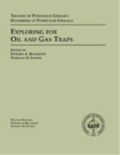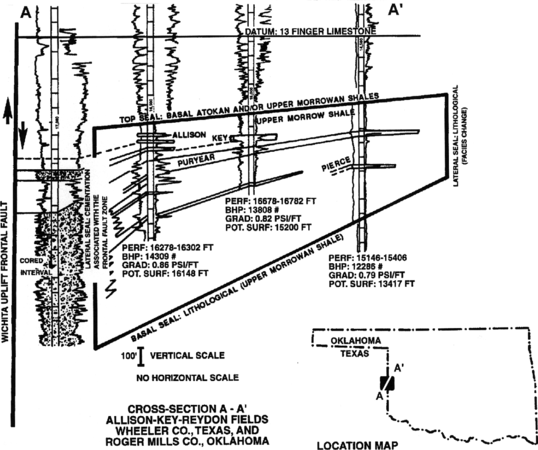Difference between revisions of "Subregional and local pressure compartments"
Cwhitehurst (talk | contribs) |
Cwhitehurst (talk | contribs) m (added Category:Treatise Handbook 3 using HotCat) |
||
| (6 intermediate revisions by the same user not shown) | |||
| Line 1: | Line 1: | ||
| + | {{Merge|Pressure compartments}} | ||
{{publication | {{publication | ||
| image = exploring-for-oil-and-gas-traps.png | | image = exploring-for-oil-and-gas-traps.png | ||
| Line 6: | Line 7: | ||
| part = Critical elements of the petroleum system | | part = Critical elements of the petroleum system | ||
| chapter = Formation fluid pressure and its application | | chapter = Formation fluid pressure and its application | ||
| − | | frompg = 5- | + | | frompg = 5-48 |
| − | | topg = 5- | + | | topg = 5-48 |
| author = Edward A. Beaumont, Forrest Fiedler | | author = Edward A. Beaumont, Forrest Fiedler | ||
| link = http://archives.datapages.com/data/specpubs/beaumont/ch05/ch05.htm | | link = http://archives.datapages.com/data/specpubs/beaumont/ch05/ch05.htm | ||
| Line 18: | Line 19: | ||
==Subregional pressure compartments== | ==Subregional pressure compartments== | ||
<gallery mode=packed widths=300px heights=300px> | <gallery mode=packed widths=300px heights=300px> | ||
| − | formation-fluid-pressure-and-its-application_fig5-26.png|{{figure number|1}}. | + | formation-fluid-pressure-and-its-application_fig5-26.png|{{figure number|1}}Example of a subregional compartment contained within the regional pressure compartment of the Anadarko basin. From Al-Shaieb et al.;<ref>Al-Shaieb, Z., J. O. Puckette, A. A. Abdalla, and P. B. Ely, 1995b, [http://archives.datapages.com/data/specpubs/memoir61/ch05/0069.htm Three levels of compartmentation within the overpressured interval of the Anadarko basin], in P. J. Ortoleva, ed., Basin Compartments and Seals: [http://store.aapg.org/detail.aspx?id=748 AAPG Memoir 61], p. 69–83.</ref> courtesy AAPG. |
| − | formation-fluid-pressure-and-its-application_fig5-25.png|{{figure number|2}}. | + | formation-fluid-pressure-and-its-application_fig5-25.png|{{figure number|2}}Pressure–depth plot of a well through the Anadarko regional pressure compartment. Modified from Al-Shaieb et al.;<ref>Al-Shaieb, Z., J. O. Puckette, A. A. Abdalla, and P. B. Ely, 1995a, [http://archives.datapages.com/data/specpubs/memoir61/ch04/0055.htm Megacompartment complex in the Anadarko basin], in P. J. Ortoleva, ed., Basin Compartments and Seals: [http://store.aapg.org/detail.aspx?id=748 AAPG Memoir 61], p. 55–68.</ref> courtesy AAPG. |
</gallery> | </gallery> | ||
| Line 26: | Line 27: | ||
==Local pressure compartments== | ==Local pressure compartments== | ||
| − | [[file:formation-fluid-pressure-and-its-application_fig5-27.png| | + | [[file:formation-fluid-pressure-and-its-application_fig5-27.png|400px|thumb|{{figure number|3}}Porous bioherm completely encased in shale.]] |
The fluids in a [[Porosity#Carbonate pore systems|porous]] [[bioherm]] completely encased in shale (as shown in [[:file:formation-fluid-pressure-and-its-application_fig5-27.png|Figure 3]]) are virtually isolated from the nearby fluid systems outside the bioherm. The bioherm, then, is a pressure compartment that may or may not be abnormally pressured. Other geological features that may form local pressure compartments are fault blocks, sand lenses, and sand wedges developed in [[growth fault]]s. | The fluids in a [[Porosity#Carbonate pore systems|porous]] [[bioherm]] completely encased in shale (as shown in [[:file:formation-fluid-pressure-and-its-application_fig5-27.png|Figure 3]]) are virtually isolated from the nearby fluid systems outside the bioherm. The bioherm, then, is a pressure compartment that may or may not be abnormally pressured. Other geological features that may form local pressure compartments are fault blocks, sand lenses, and sand wedges developed in [[growth fault]]s. | ||
| Line 35: | Line 36: | ||
* [[Pressure compartment seals]] | * [[Pressure compartment seals]] | ||
* [[Applying pressure compartment concepts to exploration]] | * [[Applying pressure compartment concepts to exploration]] | ||
| + | |||
| + | ==References== | ||
| + | {{reflist}} | ||
==External links== | ==External links== | ||
| Line 43: | Line 47: | ||
[[Category:Critical elements of the petroleum system]] | [[Category:Critical elements of the petroleum system]] | ||
[[Category:Formation fluid pressure and its application]] | [[Category:Formation fluid pressure and its application]] | ||
| + | [[Category:Treatise Handbook 3]] | ||
Latest revision as of 17:58, 17 February 2022
| It has been suggested that this article be merged with [[::Pressure compartments|Pressure compartments]]. (Discuss) |
| Exploring for Oil and Gas Traps | |

| |
| Series | Treatise in Petroleum Geology |
|---|---|
| Part | Critical elements of the petroleum system |
| Chapter | Formation fluid pressure and its application |
| Author | Edward A. Beaumont, Forrest Fiedler |
| Link | Web page |
| Store | AAPG Store |
Subregional or local (second- and third-order) pressure compartments can be found within normal pressure regimes or regional pressure compartments.
Subregional pressure compartments
Figure 1 Example of a subregional compartment contained within the regional pressure compartment of the Anadarko basin. From Al-Shaieb et al.;[1] courtesy AAPG.
Figure 2 Pressure–depth plot of a well through the Anadarko regional pressure compartment. Modified from Al-Shaieb et al.;[2] courtesy AAPG.
Figure 1 is an example of a subregional compartment contained within the regional pressure compartment of the Anadarko basin of Figure 2.
Local pressure compartments
The fluids in a porous bioherm completely encased in shale (as shown in Figure 3) are virtually isolated from the nearby fluid systems outside the bioherm. The bioherm, then, is a pressure compartment that may or may not be abnormally pressured. Other geological features that may form local pressure compartments are fault blocks, sand lenses, and sand wedges developed in growth faults.
See also
- Pressure compartments
- Regional pressure compartments
- Pressure compartment seals
- Applying pressure compartment concepts to exploration
References
- ↑ Al-Shaieb, Z., J. O. Puckette, A. A. Abdalla, and P. B. Ely, 1995b, Three levels of compartmentation within the overpressured interval of the Anadarko basin, in P. J. Ortoleva, ed., Basin Compartments and Seals: AAPG Memoir 61, p. 69–83.
- ↑ Al-Shaieb, Z., J. O. Puckette, A. A. Abdalla, and P. B. Ely, 1995a, Megacompartment complex in the Anadarko basin, in P. J. Ortoleva, ed., Basin Compartments and Seals: AAPG Memoir 61, p. 55–68.


